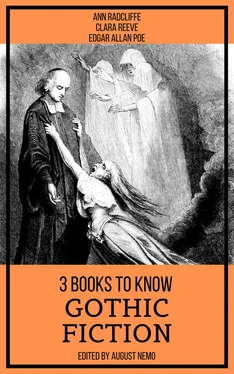The business of adjusting his rights had till now detained him from Sicily, whither he came for the sole purpose of declaring his love. Here unexpected obstacles awaited him. The jealous vigilance of the marchioness conspired with the delicacy of Julia, to withhold from him the opportunity he so anxiously sought.
When Ferdinand entered upon the subject of the southern buildings to the marquis, he carefully avoided mentioning the hidden door. The marquis listened for some time to the relation in gloomy silence, but at length assuming an air of displeasure, reprehended Ferdinand for yielding his confidence to those idle alarms, which he said were the suggestions of a timid imagination. ‘Alarms,’ continued he, ‘which will readily find admittance to the weak mind of a woman, but which the firmer nature of man should disdain. — Degenerate boy! Is it thus you reward my care? Do I live to see my son the sport of every idle tale a woman may repeat? Learn to trust reason and your senses, and you will then be worthy of my attention.’
The marquis was retiring, and Ferdinand now perceived it necessary to declare, that he had himself witnessed the sounds he mentioned. ‘Pardon me, my lord,’ said he, ‘in the late instance I have been just to your command — my senses have been the only evidences I have trusted. I have heard those sounds which I cannot doubt.’ The marquis appeared shocked. Ferdinand perceived the change, and urged the subject so vigorously, that the marquis, suddenly assuming a look of grave importance, commanded him to attend him in the evening in his closet.
Ferdinand in passing from the marquis met Hippolitus. He was pacing the gallery in much seeming agitation, but observing Ferdinand, he advanced to him. ‘I am ill at heart,’ said he, in a melancholy tone, ‘assist me with your advice. We will step into this apartment, where we can converse without interruption.’
‘You are not ignorant,’ said he, throwing himself into a chair, ‘of the tender sentiments which your sister Julia has inspired. I entreat you by that sacred friendship which has so long united us, to afford me an opportunity of pleading my passion. Her heart, which is so susceptible of other impressions, is, I fear, insensible to love. Procure me, however, the satisfaction of certainty upon a point where the tortures of suspence are surely the most intolerable.’
‘Your penetration,’ replied Ferdinand, ‘has for once forsaken you, else you would now be spared the tortures of which you complain, for you would have discovered what I have long observed, that Julia regards you with a partial eye.’
‘Do not,’ said Hippolitus, ‘make disappointment more terrible by flattery; neither suffer the partiality of friendship to mislead your judgment. Your perceptions are affected by the warmth of your feelings, and because you think I deserve her distinction, you believe I possess it. Alas! you deceive yourself, but not me!’
‘The very reverse,’ replied Ferdinand; ’tis you who deceive yourself, or rather it is the delicacy of the passion which animates you, and which will ever operate against your clear perception of a truth in which your happiness is so deeply involved. Believe me, I speak not without reason:— she loves you.’
At these words Hippolitus started from his seat, and clasping his hands in fervent joy, ‘Enchanting sounds!’ cried he, in a voice tenderly impassioned; ‘could I but believe ye! — could I but believe ye-this world were paradise!’
During this exclamation, the emotions of Julia, who sat in her closet adjoining, can with difficulty be imagined. A door which opened into it from the apartment where this conversation was held, was only half closed. Agitated with the pleasure this declaration excited, she yet trembled with apprehension lest she should be discovered. She hardly dared to breathe, much less to move across the closet to the door, which opened upon the gallery, whence she might probably have escaped unnoticed, lest the sound of her step should betray her. Compelled, therefore, to remain where she was, she sat in a state of fearful distress, which no colour of language can paint.
‘Alas!’ resumed Hippolitus, ‘I too eagerly admit the possibility of what I wish. If you mean that I should really believe you, confirm your assertion by some proof.’—‘Readily,’ rejoined Ferdinand.
The heart of Julia beat quick.
‘When you was so suddenly called to Naples upon the illness of the Marquis Lomelli, I marked her conduct well, and in that read the sentiments of her heart. On the following morning, I observed in her countenance a restless anxiety which I had never seen before. She watched the entrance of every person with an eager expectation, which was as often succeeded by evident disappointment. At dinner your departure was mentioned:— she spilt the wine she was carrying to her lips, and for the remainder of the day was spiritless and melancholy. I saw her ineffectual struggles to conceal the oppression at her heart. Since that time she has seized every opportunity of withdrawing from company. The gaiety with which she was so lately charmed — charmed her no longer; she became pensive, retired, and I have often heard her singing in some lonely spot, the most moving and tender airs. Your return produced a visible and instantaneous alteration; she has now resumed her gaiety; and the soft confusion of her countenance, whenever you approach, might alone suffice to convince you of the truth of my assertion.’
‘O! talk for ever thus!’ sighed Hippolitus. ‘These words are so sweet, so soothing to my soul, that I could listen till I forgot I had a wish beyond them. Yes! — Ferdinand, these circumstances are not to be doubted, and conviction opens upon my mind a flow of extacy I never knew till now. O! lead me to her, that I may speak the sentiments which swell my heart.’
They arose, when Julia, who with difficulty had supported herself, now impelled by an irresistible fear of instant discovery, rose also, and moved softly towards the gallery. The sound of her step alarmed the count, who, apprehensive lest his conversation had been overheard, was anxious to be satisfied whether any person was in the closet. He rushed in, and discovered Julia! She caught at a chair to support her trembling frame; and overwhelmed with mortifying sensations, sunk into it, and hid her face in her robe. Hippolitus threw himself at her feet, and seizing her hand, pressed it to his lips in expressive silence. Some moments passed before the confusion of either would suffer them to speak. At length recovering his voice, ‘Can you, madam,’ said he, ‘forgive this intrusion, so unintentional? or will it deprive me of that esteem which I have but lately ventured to believe I possessed, and which I value more than existence itself. O! speak my pardon! Let me not believe that a single accident has destroyed my peace for ever.’—‘If your peace, sir, depends upon a knowledge of my esteem,’ said Julia, in a tremulous voice, ‘that peace is already secure. If I wished even to deny the partiality I feel, it would now be useless; and since I no longer wish this, it would also be painful.’ Hippolitus could only weep his thanks over the hand he still held. ‘Be sensible, however, of the delicacy of my situation,’ continued she, rising, ‘and suffer me to withdraw.’ Saying this she quitted the closet, leaving Hippolitus overcome with this sweet confirmation of his wishes, and Ferdinand not yet recovered from the painful surprize which the discovery of Julia had excited. He was deeply sensible of the confusion he had occasioned her, and knew that apologies would not restore the composure he had so cruelly yet unwarily disturbed.
Ferdinand awaited the hour appointed by the marquis in impatient curiosity. The solemn air which the marquis assumed when he commanded him to attend, had deeply impressed his mind. As the time drew nigh, expectation increased, and every moment seemed to linger into hours. At length he repaired to the closet, where he did not remain long before the marquis entered. The same chilling solemnity marked his manner. He locked the door of the closet, and seating himself, addressed Ferdinand as follows:—
Читать дальше












